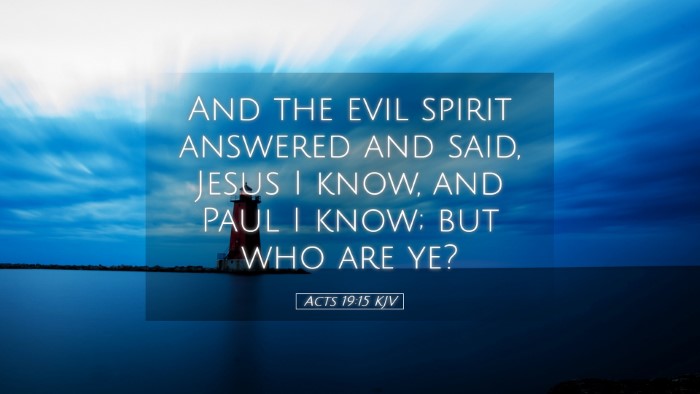Commentary on Acts 19:15
Verse: "But the evil spirit answered and said, Jesus I know, and Paul I know; but who are ye?" (Acts 19:15)
Introduction
This remarkable verse occurs during the account of Paul's ministry in Ephesus, where the Apostle encounters both the power of God and the forces of evil. In this passage, we observe the response of an evil spirit to the attempts of some itinerant Jewish exorcists trying to invoke Jesus' name for their own purposes. The verse raises profound theological and practical implications regarding authority, spiritual warfare, and the identity of Jesus and His followers.
The Context of Acts 19
Acts chapter 19 narrates the expansion of the early church, focusing on Ephesus as a significant hub of pagan worship and sorcery. Paul's arrival signifies a confrontation between the Gospel of Christ and the dark powers prevalent in the region. This context highlights the struggle between the kingdom of God and the kingdom of darkness.
The Authority of Jesus
In this verse, the evil spirit acknowledges Jesus, stating, "Jesus I know." This recognition of Jesus indicates His supreme authority over evil forces. As Matthew Henry notes, “The devils are not ignorant of Christ; they know Him as the Son of God, the Redeemer of the world, and the Judge of all mankind.” This emphasizes not only Jesus' divinity but also the effective power of His name against evil.
The Recognition of Paul
The spirit's admission of knowing Paul, "and Paul I know," suggests that Paul, as an apostle, acts under the authority of Christ. Albert Barnes remarks that this recognition stems from Paul's effective ministry and the miracles performed through him. The implication here is profound: genuine Christian authority is derived from a personal relationship with Christ and is evidenced by the power of the Holy Spirit at work in one's life.
The Rejection of the Exorcists
In stark contrast, the evil spirit's question, "but who are ye?" reveals the vulnerability and inadequacy of the Jewish exorcists. Adam Clarke observes that this rhetorical question suggests a lack of authenticity and divine backing in their actions. The evocation of Jesus' name without a true understanding or relationship leaves these exorcists powerless against evil forces. This highlights a crucial truth: mere invocation without sincere faith and discipleship is futile in spiritual encounters.
Theological Implications
This verse raises significant theological themes regarding authority and spiritual identity. The acknowledgment of Jesus and Paul by the evil spirit illustrates the cosmic battle inherent in Christian life. It also addresses a critical doctrine: the notion of spiritual authority. As believers, understanding one's identity in Christ determines the efficacy of our spiritual endeavors.
- Authority in Christ: True authority comes from being known by Christ and living in obedience to His will.
- The Danger of Imitation: The Jewish exorcists serve as a warning against using the name of Jesus without a genuine understanding of His power and personal relationship.
- Spiritual Warfare: Understanding that Christian life is a battleground allows believers to recognize the importance of being grounded in faith.
Practical Application
This verse offers several practical lessons for pastors, students, and theologians today:
- Know Whom You Serve: The importance of knowing Christ personally cannot be overstated; it directly impacts a believer's spiritual authority and effectiveness.
- Authentic Ministry: Ministry should not be merely about performing acts or rituals but should stem from a heart that is aligned with God's will.
- Preparedness in Spiritual Battles: The confrontation between good and evil requires spiritual readiness through prayer, study of Scripture, and community support.
As Paul exemplified, a life empowered by the Holy Spirit is essential for any minister or believer engaged in spiritual warfare.
Conclusion
Acts 19:15 serves as a powerful reminder of the nature of spiritual authority and the importance of a personal relationship with Christ. It challenges believers to examine their identity and stance in the ongoing battle against evil. As they navigate their faith journey, understanding the significance of being "known by" Jesus will empower them to represent His name with genuine authority and effectiveness.


